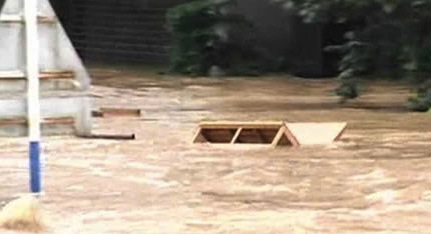The Center for Drug Evaluation and Research (CDER) at the FDA offers the following information on the use of drugs that have been potentially affected by fire, flooding or unsafe water and the use of temperature-sensitive drug products when refrigeration is temporarily unavailable.
Drugs Exposed to Excessive Heat, such as Fire
The effectiveness of drugs can be destroyed by high temperatures associated with fires. You should consider replacing your medications if there's a possibility that your medication was exposed to excessive heat, such as fires.
Lifesaving Drugs Exposed to Heat
In a disaster, it is especially important to assure the effectiveness of lifesaving drugs, and therefore these should be replaced as soon as possible. However, if the lifesaving medication in its container looks normal to you, the medication can be used until a replacement is available.
Drugs Exposed to Unsafe Water
Drugs (pills, oral liquids, drugs for injection, inhalers, skin medications) that are exposed to flood or unsafe municipal water may become contaminated. This contamination may lead to diseases that can cause serious health effects.
We recommend that drug products–even those in their original containers–should be discarded if they have come into contact with flood or contaminated water. In the ideal setting, capsules, tablets, and liquids in drug containers with screw-top caps, snap lids, or droppers, should be discarded if they are contaminated. In addition, medications that have been placed in any alternative storage containers should be discarded if they have come in contact with flood or contaminated water.
Lifesaving Drugs Exposed To Water
In many situations, these drugs may be lifesaving and replacements may not be readily available. For these lifesaving drugs, if the container is contaminated but the contents appear unaffected–if the pills are dry–the pills may be used until a replacement can be obtained. However, if a pill is wet, it is contaminated and should be discarded.
Reconstituted Drugs
For children's drugs that have to be made into a liquid using water (reconstituted), the drug should only be reconstituted with purified or bottled water. Liquids other than water should not be used to reconstitute these products.
Drugs that Need Refrigeration
Some drugs require refrigeration (for example, insulin, somatropin, and drugs that have been reconstituted). If electrical power has been off for a long time, the drug should be discarded. However, if the drug is absolutely necessary to sustain life (insulin, for example), it may be used until a new supply is available.
Because temperature sensitive drugs lose potency if not refrigerated, they should be replaced with a new supply as soon as possible. For example, insulin that is not refrigerated has a shorter shelf life than the labeled expiration date. (Please see Information Regarding Insulin Storage for more details.)
If a contaminated product is considered medically necessary and would be difficult to replace quickly, you should contact a healthcare provider (for example, Red Cross, poison control, health departments, etc.) for guidance.
If you are concerned about the efficacy or safety of a particular product, contact your pharmacist, healthcare provider or the manufacturer's customer service department.
常常發生天災(人禍?)的台灣,是不是也應該思考一下這個問題呢?






 留言列表
留言列表
 線上藥物查詢
線上藥物查詢 